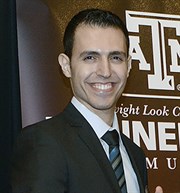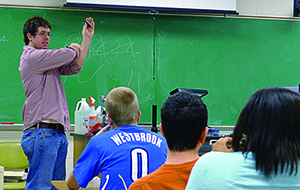 Tony Akl and Brian Cummins, graduate students in the Department of Biomedical Engineering at Texas A&M University, each have been named recipient of the 2014 Distinguished Graduate Award for Excellence in Research-Doctoral by The Association of Former Students at Texas A&M.
Tony Akl and Brian Cummins, graduate students in the Department of Biomedical Engineering at Texas A&M University, each have been named recipient of the 2014 Distinguished Graduate Award for Excellence in Research-Doctoral by The Association of Former Students at Texas A&M.
Akl and Cummins are advised by Professor and Department Head Gerard Cote. As honorees, they each will receive a watch and framed certificate.
The Association of Former Students at Texas A&M each year recognizes graduate students in one of three categories: Excellence in Research-Doctoral, Excellence in Research-Master’s and Excellence in Teaching. The award recipients are chosen by a panel of reviewers, which includes faculty and administrators.
Akl has maintained a 4.0 GPA while working as a graduate research assistant in the Optical BioSensing Laboratory. His research focuses on developing optical imaging and sensing systems for disease detection and monitoring. His graduate work at Texas A&M has involved the design and testing of an implantable sensor for monitoring organ transplants and detecting graft complications at an early stage. After graduating, Akl intends to continue his research career in biomedical optics with a focus on wearable and implantable devices for health and fitness applications.
Akl has published seven original refereed journal articles with two more in review, and 22 conference proceedings and presentations at national and international meetings. His work has resulted in two patent applications, and he was awarded numerous national and international awards, including the 2012 George W. Kunze Endowed Graduate Award for excellence in academics, research and service, the 2013 Outstanding Engineering Graduate Student, and two scholarships from the international Society for Optics and Photonics for his potential contributions to the field of optics.
 Cummins’ doctoral work focused on the development of a fluorescent, affinity-based glucose sensor to continuously track glucose concentrations in the interstitial fluid. His work has resulted in several publications and presentations, and a provisional patent on this technology is being converted into a full utility patent. To translate this technology into a commercial product, Cummins co-founded Glucid Innovations. Cummins recently accepted a postdoctoral association position at North Carolina State University to develop a point-of-surgery clinical test for parathyroid hormone concentrations in the blood and is collaborating with surgeons at the medical school at the University of North Carolina.
Cummins’ doctoral work focused on the development of a fluorescent, affinity-based glucose sensor to continuously track glucose concentrations in the interstitial fluid. His work has resulted in several publications and presentations, and a provisional patent on this technology is being converted into a full utility patent. To translate this technology into a commercial product, Cummins co-founded Glucid Innovations. Cummins recently accepted a postdoctoral association position at North Carolina State University to develop a point-of-surgery clinical test for parathyroid hormone concentrations in the blood and is collaborating with surgeons at the medical school at the University of North Carolina.
During his graduate career, Cummins received the Texas A&M Merit Fellowship and was a co-PI on a grant that was named a finalist for the Student Technology Prize in Primary Healthcare Center for Integration of Medicine & Innovative Technology. Cummins also received a summer grant from the Whitaker Foundation to join the labs of Professor Duncan Graham and Professor David Birch at the University of Strathclyde in Glasgow as a visiting researcher.